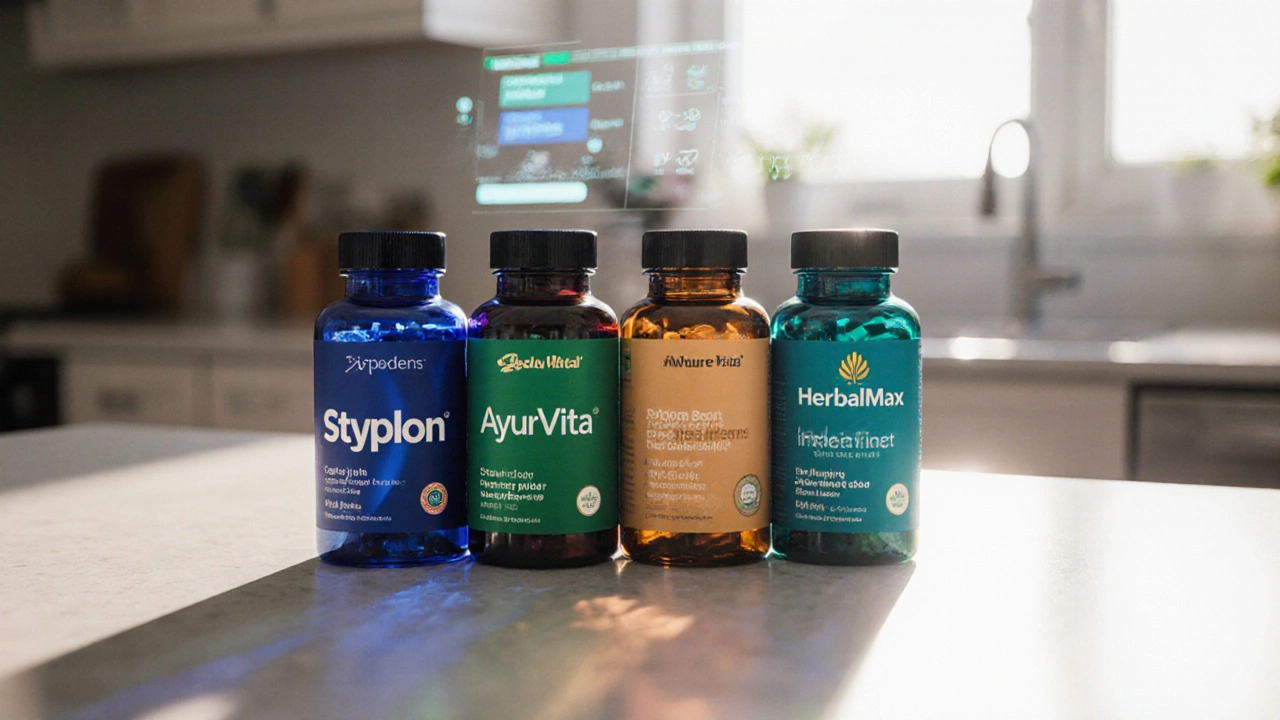Mastering herbal supplement comparison: What to Look For and Why It Matters
When working with herbal supplement comparison, the process of evaluating plant‑based products side by side to judge their benefits, risks, and value. Also known as herb supplement review, it helps you pick the right natural aid for your needs. In this guide we also talk about pennyroyal supplement, a potent herb used for digestion and menstrual comfort, Ylang Ylang oil, an aromatic extract praised for stress relief and hormone balance, and ivy gourd, a tropical vegetable linked to blood‑sugar support. Together these examples illustrate how a solid comparison can cut through hype and plain facts.
Why Compare? The Core Benefits of a Structured Review
People compare herbal supplements because the market is crowded and claims vary wildly. A good herbal supplement comparison gives you three main advantages: it clarifies efficacy, highlights safety issues, and shows cost‑effectiveness. Efficacy evaluation influences consumer choice, while safety assessment requires looking at side‑effects, drug interactions, and dosage limits. In other words, the more data you stack, the clearer the picture of what actually works for you.
Another key point: comparing supplements forces you to think about the context of use. For instance, pennyroyal may be great for mild digestive upset, but it can be toxic at high doses, so the safety profile changes dramatically when you move from occasional to daily use. Ylang Ylang oil, on the other hand, shines in stress‑reduction protocols but offers little value for blood‑sugar control, which is where ivy gourd steps in. These contextual nuances are the reason a structured comparison beats a simple “I heard it works” recommendation.
When you line up the data, you also spot gaps in research. Many herbal products lack large‑scale clinical trials, so you’ll often rely on smaller studies, traditional use records, and expert opinions. Recognizing the quality of evidence is part of the comparison process: a well‑documented safety profile can outweigh a modest efficacy claim.
Key Factors to Weigh in Any Herbal Supplement Comparison
Below are the pillars you should stack when you compare any herb‑based product:
- Efficacy: What does the scientific literature say? Look for randomized trials, meta‑analyses, or at least peer‑reviewed studies.
- Safety: Identify known side‑effects, contraindications, and interaction warnings.
- Dosage & Formulation: Extract type (tincture, capsule, oil), concentration, and recommended daily amount matter a lot.
- Cost & Availability: Price per standard dose and where you can buy it safely (licensed pharmacies, vetted online stores) are practical concerns.
- Consumer Reputation: User reviews, third‑party certifications, and brand transparency add a real‑world layer to the data.
These criteria create a semantic triple: herbal supplement comparison encompasses efficacy evaluation, requires safety assessment, and guides cost‑effective choices. When you keep those three predicates in mind, each new product you examine slots neatly into the same framework.
Let’s see how this works with three popular herbs.
Case Studies: Pennyroyal, Ylang Ylang, and Ivy Gourd
Pennyroyal supplement is often marketed for digestive support and menstrual comfort. The active compound pulegone can relax smooth muscle, which explains the gut‑relief claim. However, pulegone is also hepatotoxic at high levels, so the safety profile forces you to stay well below the recommended daily maximum. In a comparison chart, pennyroyal would rank high for specific gut issues but low for overall safety if the dosage isn’t tightly controlled.
Ylang Ylang oil shines in stress‑reduction and hormone‑balancing contexts. Small clinical trials show lowered cortisol after inhalation, and aromatherapy users report improved sleep quality. Safety-wise, it’s a low‑risk oil when used topically or diffused, but ingestion can cause nausea. In a side‑by‑side view, Ylang Ylang scores strong on mood benefits and safety, but its efficacy for metabolic concerns is minimal.
Ivy gourd (Coccinia grandis) is praised for blood‑sugar modulation. Animal studies suggest it may improve insulin sensitivity, and traditional cuisines use it as a low‑calorie vegetable. The safety record is good for most adults, though chronic kidney patients should limit intake. When you compare ivy gourd to pennyroyal and Ylang Ylang, it occupies a different niche—metabolic health rather than digestion or stress—showing how a comprehensive comparison surfaces complementary uses.
These three examples illustrate how the same comparison framework can reveal both overlapping strengths and distinct gaps. By lining up efficacy, safety, dosage, cost, and reputation, you get a clear map of which herb fits your personal health goal.
How to Pull Reliable Data for Your Own Comparison
Start with reputable databases: PubMed for peer‑reviewed studies, the Natural Medicines Comprehensive Database for safety ratings, and the USP for quality standards. Cross‑check brand claims against third‑party certifications like GMP or NSF. When you find a study, note the population size, dosage used, and outcome measures—those details feed directly into the comparison matrix.
Next, gather real‑world feedback. Look for verified buyer reviews on platforms that require proof of purchase. Pay attention to recurring themes: “caused stomach upset,” “helped me sleep,” or “price too high.” Those patterns can tip the scales when scientific evidence is sparse.
Finally, calculate cost per effective dose. Divide the price of the bottle by the number of recommended daily servings that match the study’s proven dose. This simple math often reveals that a premium brand isn’t always the best value.
What’s Next? Dive Into Our Curated Articles Below
The posts you’ll see next apply this exact framework to a range of products—from detailed side‑by‑side charts of popular herbs to buying guides that flag safe online sources. Expect practical dosage tables, safety checklists, and clear cost comparisons that let you make confident decisions without hunting through endless forums. Ready to see how pennyroyal stacks against other digestive aids, or how Ylang Ylang measures up to stress‑relief options? Scroll down and explore the full collection.
Styplon vs Top Natural Supplement Alternatives: Full Comparison Guide
Discover how Styplon stacks up against top natural supplement alternatives. Learn about its ingredients, benefits, safety, pricing, and which product is best for your health goals.
Read more
